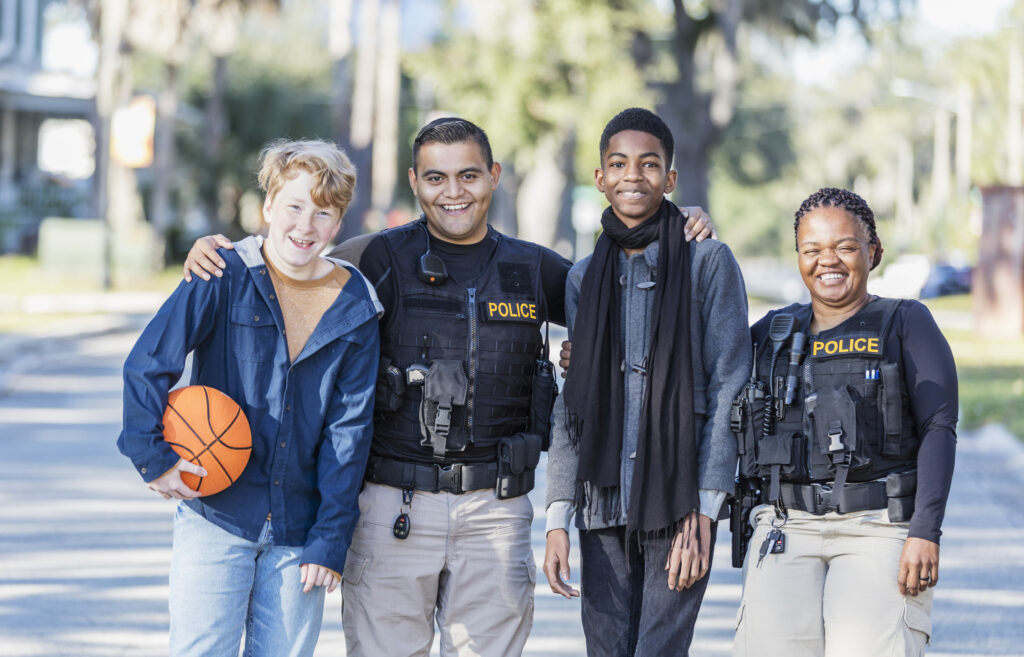SRO1: Promoting a Safe and Supportive School Climate
Safe and supportive school environments help to promote student learning. Establishing a positive school climate is an evidence-based prevention approach to ensuring school safety and reducing student academic and behavioral problems. Designed for School Resource Officers, this course explores what a safe and supportive school environment looks like, offers strategies for reducing school violence, and suggests methods for promoting and measuring safety and supportiveness at your school. This course is the first in a six-part series titled MSP Training in School Safety and Mental Health for School Resource Officers.
In this course, you will:
- Analyze school safety personnel’s role in ensuring a positive school climate.
- Describe the connection between school climate, school safety, and preventing school violence.
- Examine a school’s climate for the purpose of school improvement and accountability.
SRO2: Teaming and Collaborative Data-based Problem Solving
A safe and supportive learning environment can be maximized when relevant stakeholders are working together via a data-based, problem-solving approach. Designed for School Resource Officers, this course provides an overview of what it takes to improve team building within your school, break down communication barriers with community-based stakeholders, and ensure your school safety team follows student privacy regulations. This course is the second in a six-part series titled MSP Training in School Safety and Mental Health for School Resource Officers.
In this course, you will:
- Identify ways of working across systems of care.
- Analyze best practices in teaming and collaborative, data-based problem-solving.
- Examine key privacy concerns faced in schools.
SRO3: Early Identification of Mental Health Challenges
Early identification of student mental health challenges is an essential component of a safe and supportive school learning environment. Awareness of the types of behaviors reflecting a mental health concern or crisis can help schools to efficiently and effectively provide the necessary support to students who are in need. Designed for School Resource Officers, this course provides an overview of how to recognize early mental health warning signs in students, create a school-based threat and suicide assessment process, and respond to student mental health concerns. This course is the third in a six-part series titled MSP Training in School Safety and Mental Health for School Resource Officers.
In this course, you will:
- Recognize early mental health warning signs and common mental health challenges in schools.
- Describe school-based threat and suicide assessment processes.
- Identify ways to respond and support mental health concerns.
SRO4: Mental Health Interventions and Care Coordination
Providing a continuum of school-based supports to students who are experiencing mental health challenges is an essential component of a safe and supportive school learning environment. When significant emotional and behavioral problems arise, knowing how to work with others in your school to connect students to community-based supports may also be required. Designed for School Resource Officers, this course provides an overview of how to connect students with varying mental health needs to necessary supports both within and outside the school setting. This course is the fourth in a six-part series titled MSP Training in School Safety and Mental Health for School Resource Officers.
In this course, you will:
- Recognize when and why it is appropriate to connect students to school-based mental health supports.
- Describe the continuum of interventions available to students.
- Identify ways to utilize systems of care, legislation, and policy to continuously improve student access to effective mental health services.
SRO5: Working with Diverse Populations
A positive school climate that meets the needs of all is essential to promoting a safe and supportive learning environment. Students from diverse backgrounds often face unique challenges that differ from their peers. These differences may require unique inclusionary practices or the ability to access a unique set of services. Designed for School Resource Officers, this course provides an overview of how to recognize challenges associated with diverse student identities and build a positive school climate for all students. This course is the fifth in a six-part series titled MSP Training in School Safety and Mental Health for School Resource Officers.
In this course, you will:
- Recognize challenges associated with diverse student identities.
- Identify diversity and inclusion topics and practices in schools.
- Understand how school safety personnel can contribute to a positive school climate for all students.
SRO6: Self-Care and Wellness
School Resource Officers routinely encounter stress while helping to create and ensure a safe and supportive learning environment for all students. It’s paramount that those in this role take their own self-care and wellness seriously. Designed for School Resource Officers, this course provides an overview of common signs that self-care is needed, a diverse array of self-care methods, tips for building resilience to avoid burnout, and where and how to seek additional support. This course is the sixth in a six-part series titled MSP Training in School Safety and Mental Health for School Resource Officers.
In this course, you will:
- Recognize signs of needed self-care, such as stress and anxiety, that deviate from overall wellness.
- Identify a diverse array of self-care methods.
- Build resilience to avoid burnout, trauma, and dissonance between your expectations and capacity as a school resource officer.
- Learn where and how to seek additional support.
